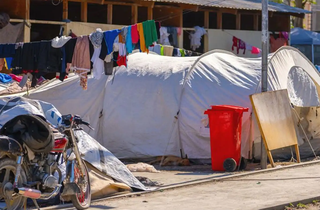The International Organization for Migration (IOM) has reported a 22% increase in the number of displaced persons since June, primarily driven by escalating gang violence.
Grégoire Goodstein, IOM Chief in Haiti, emphasized the urgent need for international support to address the growing crisis. "The sharp rise in displacement underscores the urgent need for a sustained humanitarian response," he stated. "We call on the international community to step up its support for Haiti's displaced populations and the host communities that continue to show remarkable resilience in the face of these challenges."
The majority of displaced Haitians are currently residing in the provinces, with the Grand Sud region hosting the largest number. However, the capital Port-au-Prince remains a hotspot for displacement, with many people living in overcrowded conditions and lacking access to basic services.
Host communities are bearing the brunt of the crisis, accommodating a significant portion of the displaced population. These communities are facing immense strain on their resources, including food shortages, overwhelmed healthcare facilities, and limited access to essential supplies.
Local infrastructure and services are also under pressure, particularly in the provinces, with food insecurity, adequate shelter, and access to healthcare and education being among the most pressing needs.
Despite ongoing access challenges, IOM continues to provide critical assistance to both displaced people and host communities. The organization is working closely with partners to ensure that humanitarian aid reaches those in need, even in inaccessible areas.
IOM reaffirms its commitment to supporting the Haitian government and international partners in providing life-saving assistance and finding long-term solutions for the displaced population. The restoration of stability and security across the country is crucial to addressing the humanitarian crisis and alleviating the suffering of those affected. (ILKHA)
❗Over 700,000 people are displaced in Haiti, half are children as the humanitarian crisis worsens.
As needs grow, IOM and partners continue to provide critical assistance to displaced people and host communities despite ongoing access challenges.https://t.co/gzVufk4xvp pic.twitter.com/nNYmVexme4



 Sağlık
Sağlık
 Güncel
Güncel
 Güncel
Güncel
 Güncel
Güncel
 Güncel
Güncel
 Güncel
Güncel
 Güncel
Güncel
 Dünya
Dünya
 Güncel
Güncel
 Güncel
Güncel





